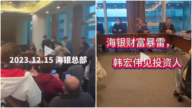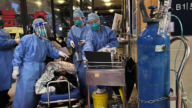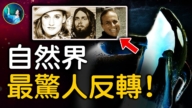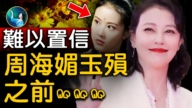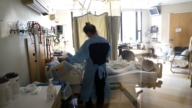【新唐人北京時間2018年09月11日訊】【世事關心】(479)美國校園持續清除中共影響,學術自由是美國學界的核心理念,在它的保護下,學生和教師可以不受壓制的,自由的從事學術活動。但是當中共這樣一個外來專制權威侵入校園的時候,是否會危及到學術自由,人們的這種擔心具體體現在孔子學院上。
人們開始擔心孔子學院可能會損害學術自由。
The Confucius Institute is causing concerns about America’s academic freedom.
馬克•盧比奧(美國參議員):「我認為各大學都應該了解孔子學院的任務。外國政府一直在通過孔子學院壓制學術自由。」
Sen. Marco Rubio:「 I think every college should be aware of what these institutes are used for and that they are in fact consistently being used in a way to quash academic freedom on campus at the behest of a foreign government. 」
最新的國防法案禁止國防部給予孔子學院資助,但是這就足夠了嗎?
The newest defense bill bars Confucius Institutes from Pentagon funding, but is it enough?
羅歇爾•彼得森:「國防授權法是促使各大學與孔子學院脫鉤的重要一步。但是,單靠它還不夠。」
Rachelle Peterson: 「The National Defense Authorization Act is an important step in the right direction in incentivizing colleges and universities to disentangle their Confucius Institutes from the rest of the college campus. But, unfortunately, it is not sufficient in itself.」
明尼蘇達大學關閉了中國人權問題研究專家科克•埃里森博士的一個項目。
Narration: The University of Minnesota closed a program hosted by Dr. Kirk Allison who confronted China on human rights issues.
科克•埃里森博士(人權與衛生項目主管2006-2016):「如果一個學校想躋身上流,就必須與中國大陸進行某種合作。」
Dr. Kirk Allison:「 If you’re wanting to be one of the top three universities or one of the whatever, it’s hard to do all of that and not play ball with a fifth of the world’s population. 」
但是這個博弈仍在繼續。
But the fight goes on.
蕭茗(Host/Simone Gao):「明尼蘇達大學在2012年10月授予陳竺榮譽博士學位。他是中國衛生部長。您對此有異議,原因是什麼?」
「 In October 2012, the university of Minnesota granted an honorary doctorate to Dr. Chen Zhu. I think he is the minister of Health from China. You were against it why?」
科克•埃里森博士(人權與衛生項目主管2006-2016):「中共殺戮良心犯,還為了獲取器官而殺人,罪行累累。不應該把榮譽博士學位頒給中共體制內高官。」
Dr. Kirk Allison: 「It’s not proper to provide an honorary doctorate for an individual who was sitting administratively at the top of a system in which prisoners in a death penalty system in which insufficient representation in particular, in which there’s been confirmed reports of prisoners of conscience being executed or being sources of organs, et cetera, to receive an honorary doctorate. 」
蕭茗(Host/Simone Gao):歡迎收看《世事關心》,我是蕭茗。學術自由是美國學界的核心理念。在它的保護下,學生和教師可以不受壓制的,自由的從事學術活動。但是當中共這樣一個外來專制權威侵入校園的時候,是否會危及到學術自由?人們的這種擔心具體體現在孔子學院問題上。但是中共對高教系統的影響是否擴散到了其它領域?在這一期《世事關心》,我們來探討中共對大學校園的滲透,是如何影響到教師、學生、和學術誠信的。
Hello, Welcome to 《Zooming In 》,I’m Simone Gao. Academic freedom is the cornerstone of American academia. It protects the rights of teachers and students to research and discuss their subjects without fear of censorship or discipline. But what happens to academic freedom when a foreign, authoritarian government like China takes root on U.S. campuses? This is the controversy surrounding China’s Confucius Institute. But does China’s influence on American campuses extend past Confucius Institutes? In this episode, we’ll take a look at how China’s influence on American campuses affects professors, students and academic integrity.
孔子學院如何危及美國學術自由
How Confucius Institutes Threaten Academic Freedom
孔子學院於2004年由國家「漢辦」成立,而「漢辦」則由12個國家級政府部門監管,包括外交部、文化部、教育部、國務院新聞辦公室等。
The Confucius Institute was established in 2004 by 「Hanban」, which is overseen by 12 national level government bodies, including the Ministry of Foreign Affairs, Ministry of Culture, Ministry of Education, the State Council Information Office and more.
目前,在美國大學校園裡有100多所孔子學院,美國中小學校總共有500多個孔子課堂。
There are currently over 100 Confucius Institutes on U.S. university campuses and over 500 K-12 Confucius Classrooms in the U.S.
據全國學者協會一份關於孔子學院題為「外包給中國」的研究報告得知,「漢辦」為孔子學院提供運營資金和運營保護,支付中文教師和工作人員的費用。「漢辦」還提供教科書和批準孔子學院的課程記入學分。
According to Outsourced to China, a research paper on Confucius Institutes by the National Association of Scholars,「 Hanban」 provides operating funds and screens and pays Confucius Institutes’ Chinese teachers and staff members.「 Hanban」 also provides textbooks and approves Confucius Institute courses, which are sometimes offered for credit.
通過粉飾歷史和內容審查,孔子學院力圖向當代美國人宣傳,類似中共政權官方版本的歷史。
By whitewashing history and censoring content, the Confucius Institute strives to educate a generation of Americans to know little more of China than the regime’s official history.
在2011年孔子學院北京總部的演講中,政治局常委李長春說:「孔子學院是一個富於影響力的品牌,旨在海外拓展我們文化。它為提高我們的軟實力做出了重要貢獻。」 『孔子』品牌具有天然的吸引力。以教授中文為由一切看起來也就合情合理。
In a 2011 speech at the Confucius Institute’s Beijing headquarters, Standing Politburo Committee member Li Changchun said:「The Confucius Institute is an appealing brand for extending our culture abroad. It has made an important contribution toward improving our soft power. 」The『Confucius』brand has a natural attractiveness. Using the excuse of teaching Chinese language, everything looks reasonable and logical.
對於一些美國政客來說,這一切也同樣合情合理。 在今年4月舉行的美中教育交流座談會上,當被問及美國校園對孔子學院日益增加的擔憂時,前國會議員馬特•薩爾蒙說:
Everything looks reasonable and logical to some American politicians too. At a forum on U.S.-China educational exchanges in April this year, when asked about the rising concerns over Confucius Institutes on American campuses, former member of the Congress Matt Salmon said this:
Matt Salmon(前美國國會議員):「美中關係中有很多值得關注的議題,但是我們不能因噎廢食。取消這些項目不是解決問題的辦法,而是應該增加。這樣會增進彼此間的了解,促成更多的對話和互動。所以我認為這些項目只是需要更多監管,我認為現有監管機制能確保這些項目不脫離正軌。」
國防部批準了亞利桑那大學、斯坦福大學、和華盛頓大學的孔子學院為期三年的資助。Salmon先生認為這有力的證明孔子學院是無害的。
The Department of Defense granted 3 years of funding to the Confucius Institutes at the University of Arizona, Stanford, and the University of Washington. Mr. Salmon argued this is solid proof that CIs are harmless.
馬特•薩爾蒙 (前美國國會議員):「如果國防部確信或者擔心孔子學院是一個國家安全隱患,他們根本就不會批準撥款。」
Matt Salmon: 「Again I would go back that if the DOD believed or had serious reservations that the Confucius Institutes are some kind of threat to national security, they wouldn’t in their wildest dreams decide to provide grant funding for them to do that. 」
但這一切很快有了改變。 大約在同一時間,薩爾蒙先生為孔子學院辯護,兩位國會議員致信德州A&M關於對其孔子學院的擔憂。 幾天後,學校表示將終止協議。 今年5月,參議員馬可•盧比奧也致信佛羅里達州的三所大學談及他們的孔子學院。
But all this changed quickly. Around the same time Mr. Salmon defended the Confucius Institute, two congressmen wrote to Texas A&M raising concerns about its Confucius Institute. Days later, the school said it would terminate its agreement. In May, Senator Marco Rubio (link to article with his letter) also sent a letter to three colleges in Florida regarding their Confucius Institutes.
馬可•盧比奧(美國參議員):「我認為各大學都應該了解孔子學院的任務。外國政府一直在通過孔子學院壓制學術自由。我敦促所有大學關閉其校內的孔子學院。沒有必要搞孔子學院。」
Sen. Marco Rubio:「I think every college should be aware of what these institutes are used for and that they are in fact consistently being used in a way to quash academic freedom on campus at the behest of a foreign government. And I would encourage every college in America to close them. There’s no need for these programs.」
今年8月,特朗普總統簽署了最新的國防授權法案(NDAA)。它禁止國防部為美國校園的孔子學院提供資金。將來,任何同時擁有國防部資助和中國政府資助的中文項目的大學,如果想要保留資助需要獲得國防部的免責聲明。幾天後,北佛羅里達大學表示將關閉其孔子學院。
In August, President Trump signed the latest National Defense Authorization Act (NDAA). It prohibits Pentagon funding for Confucius Institutes on U.S. campuses. In the future, any universities that have Pentagon-funded and Chinese government-funded Chinese language programs will have to secure a Pentagon waiver if they want to keep both. A few days later the University of North Florida said it would close its Confucius Institute.
蕭茗(Host/Simone Gao):美國大學裡的孔子學院都干了些什麼?我採訪了羅歇爾•彼得森,她是全國學者協會的科研部主任,《外包給中國:孔子學院給高等教育帶來的影響》。
What will happen to the Confucius Institutes on American campuses? I discussed this with Rachelle Peterson, director of research projects at the National Association of Scholars. She wrote 《Outsourced to China: Confucius Institutes and Soft Power in American Higher Education》.
蕭茗(Host/Simone Gao):「您覺得單靠《2019年度國防授權法》,是否能有效防止中共對美國大學施加影響?」
「 Do you think the National Defense Authorization Act of 2019 does enough to counter the Chinese Communist regime’s influence on American campuses?」
羅歇爾•彼得森(全國學者協會科研部主任):「《國防授權法》是促使各大學與孔子學院脫鉤的重要一步。但是,單靠它還不夠。《國防授權法》只是禁止國防部資助大學裡與孔子學院有關的中文項目。各大學只要把國防部資助的項目和孔子學院的項目分開就行了,兩者可以同時運行,所以還需要有其它措施,才能讓各大學和孔子學院完全脫鉤。」
Rachelle Peterson: 「《The National Defense Authorization Act》 is an important step in the right direction in incentivizing colleges and universities to disentangle their Confucius Institutes from the rest of the college campus. But, unfortunately, it is not sufficient in itself. The NDAA forbids the Department of Defense from funding Chinese language programs that are entwined with Confucius Institutes on campus. But as long as the university completely separates its Pentagon-funded program from its Confucius Institute, then the university can continue to operate both. So more needs to be done to encourage colleges and universities to cut their ties with their Confucius Institutes. 」
蕭茗(Host/Simone Gao):「還需要哪些其它措施?」
「 What else needs to be done?」
羅歇爾•彼得森(全國學者協會科研部主任):「聯邦政府應該對那些關閉孔子學院的大學增加撥款。關閉孔子學院應該成為獲得聯邦撥款的先決條件。《高等教育法案》正面臨重新修訂,全國學者協會已經敦促國會考慮這一措施。我們還要求各大學在孔子學院問題上增加透明度。目前各大學與中共政府秘密簽約建立孔子學院。這是不應該的。這些秘約必須公開,公眾應該了解中共政府對這些孔子學院的投入。從公開透明的角度出發必須這樣做,這也是為了彰顯高等教育部門的廉潔。」
Rachelle Peterson: 「The federal government should condition more federal funding on colleges and universities closing their Confucius Institutes. It should be a condition to receive federal funding to close that Confucius Institute down. The Higher Education Act is currently up for reauthorization, and the National Association of Scholars has encouraged Congress to include language to that effect. We’ve also said that there needs to be more transparency. Right now colleges and universities are signing secret contracts with the Chinese government for the purpose of setting up their Confucius Institutes. There should be no secret contracts between American colleges and the Chinese government. Those contracts need to be made public, and the American people need to know the amount of money that the Chinese government has invested into these Confucius Institutes. All of this needs to be made publicly available for the sake of transparency and for protecting the integrity of American higher education. 」
蕭茗(Host/Simone Gao):「談到高教部門的廉潔,孔子學院是如何影響美國學者的?同一所大學的非孔子學院學者,能否發表批評中共的言論?」
「 Talking about the integrity of American higher education, how do Confucius Institutes impact American scholars? Say, if these scholars are not staff members of the Confucius Institutes but are on the same campus with the CI, will they be able to publish on topics critical of the CCP?」
羅歇爾•彼得森(全國學者協會科研部主任):「我實地研究了12所建有孔子學院的大學。我訪談了那裡的學者。我發現,孔子學院的存在妨礙了他們討論敏感問題。他們不僅受到來自中共的壓力,也受到來自內部的壓力,因為孔子學院是一個財源,所以各大學的管理部門不願得罪中共。他們成了中共控制輿論的幫手,這給校內的教授們造成了嚴重的影響。既限制了他們在中國研究問題上的學術自由,也限制了在這個問題上的教學自由。」
Rachelle Peterson:「 I did case studies at 12 colleges with Confucius Institutes, and I talked to the scholars on those campuses. And what I found is that many, many professors felt that the presence of a Confucius Institute increased the pressure on them to avoid talking about sensitive topics. They felt that pressure from China, but they also felt that pressure from their own university administrations who didn’t want to jeopardize the funding stream that Confucius Institutes had generated. The universities themselves had turned into enforcers of China’s speech codes and had effectively passed those on to the professors. So it was limiting their academic freedom and their freedom to teach their students openly on issues related to China.」
除了妨礙學術自由,中共還在哪些方面迫害學者?
Besides academic freedom, what else has the Chinese regime’s presence on American campuses done to scholars.
How China’s Presence on U.S. Campuses Affects Scholars
明尼蘇達大學批評中共教授被關閉項目
中國對美國校園的影響不僅限於孔子學院。 許多大學依靠中國留學生來彌補減少的入學人數。根據國際教育學院的數據,2016年至2017年,美國有超過35萬名中國留學生。中國是美國國際學生最大的生源地,中國留學生占美國國際學生總數的32%。這使得中國給美國大學造成影響,包括資助孔子學院和派遣赴美學生。產生的一個副作用就是(大學的)自我審查。作用最明顯的領域在中國研究,但商學院、法學院、甚至醫學院都能感受到壓力,明尼蘇達大學雙子城正是在這種境況之下。
China’s influence on U.S. campuses is not limited to Confucius Institutes. Many universities rely on Chinese international students to make up for dwindling enrollment. According to data from the Institute of International Education (link), there were over 350,000 Chinese international students in the U.S. from 2016 to 2017. China is the number one country of origin, making up 32 percent of all international students in the U.S. This gives China leverage over universities, both with funding for CIs and sending students to the U.S. One side-effect of this is self-censorship. The most obvious area is China studies, but business schools, law schools, and even medical schools can feel the pressure, which is what happened at the University of Minnesota–Twin Cities.
明尼蘇達大學與中國有很強的聯繫。它的中國中心成立於1979年,明尼蘇達大學是美中關係正常化以後首批和中國恢復關係的美國大學。2008年,它成立了孔子學院。據College Factual報導,在明尼蘇達大學有近3000名中國學生。
The U of M has strong ties to China. Its China Center was established in 1979, making the U of M one of the first U.S. universities to resume ties following the normalization of U.S.-China relations. (China Center link) In 2008, it established a Confucius Institute (link). According to College Factual, there are almost 3,000 students from China at the U of M.
Kirk Allison博士從2006年至2016年主導明尼蘇達大學的人權與健康課題。他直言不諱地批評中國器官移植系統。連續的可靠的報導表明該系統支撐了一個有計劃的、國家準許的器官摘取鏈條,器官非自願的取自良心犯,包括法輪功學員、其他宗教成員和少數民族群體。2012年,明尼蘇達大學授予中國衛生部部長陳竺榮譽博士學位。對此,Allison博士公開表示反對。
Dr. Kirk Allison directed the University of Minnesota’s Program in Human Rights and Health from 2006 to 2016. He’s an outspoken critic of China’s organ transplant system, which persistent and credible reports indicate supports a systematic, state-sanctioned organ harvesting from non-consenting prisoners of conscience including Falun Gong practitioners and members of other religious and ethnic minority groups. In 2012, the University of Minnesota granted an honorary doctorate to Chen Zhu, Minister of Health from China. Dr. Allison openly objected to it.
蕭茗(Host/Simone Gao):「2012年10月,明尼蘇達大學為陳竺授予榮譽博士學位,他當時是中國衛生部部長。您反對授予他學位,為什麼?」
「 In October 2012, the University of Minnesota granted an honorary doctorate to Dr. Chen Zhu. I think he was the Minister of Health from China. You were against it. Why?」
科克•埃里森博士(人權與衛生項目主管2006-2016):「在我看來,不應該把榮譽博士學位頒給中共體制內高官。中共的司法系統不給死囚提供法律援助,有確鑿的證據證明中共殺戮良心犯,還為了獲取器官而殺人,罪行累累。」
Dr.Kirk Allison:「However, as minister of health, he was sitting on the top of the civilian side of a system in which something upwards of perhaps 10,000 organs are being transplanted, that were multiple thousands are being transplanted, that were being sourced by executed prisoners by that time…So in my view it’s not proper to provide an honorary doctorate for an individual who was sitting administratively at the top of a system in which prisoners in a death penalty system in which there’s insufficient representation, in particular, in which there’s been confirmed reports of prisoners of conscience being executed or being sources of organs, et cetera, to receive an honorary doctorate. 」
2016年,學校取消了Allison博士的人權與健康項目。
In 2016, Dr. Allison’s Program in Human Rights and Health was closed by the university.
蕭茗(Host/Simone Gao):「您曾是明尼蘇達大學公共衛生學院人類權利與健康項目的主任。那個項目被取消了,是嗎?」
「So you were the director of the Program in Human Rights and Health at the University of Minnesota School of Public Health. And now that program was closed, right?」
科克•埃里森博士(人權與衛生項目主管2006-2016):「是的,學校在取消這個項目的時候,找了種種藉口。我不想提及太多的細節,但是我認為校方的一些理由不成立。整個決策過程不透明,校方沒有回應我們公開財務和其它細節的要求。」
Dr. Kirk Allison:「Right. And there are various justifications given for the closure of the program. I’m not wanting to get into too much detail, but I would say some of the justifications given have not, in my view, added up. And requests for transparency, particularly on financial claims and things, have not been forthcoming. And so it would be good if it were reestablished. There was a lot of — there were 20 – there were 32 letter of support for the program that were presented from individuals, both in the university, involved in various human rights programs and divisions here, internationally, nationally, in the community.」
蕭茗(Host/Simone Gao):「您的項目需要多少資金?」
「So how much money did your program need?」
科克•埃里森博士(人權與衛生項目主管2006-2016):「不是很多,諷刺的是,項目被關閉的那年,我們從學費中,甚至是我們開的課程中獲得的收入,遠遠超過項目的預算。」
Dr. Kirk Allison: 「It was not a great deal, in terms of these things. And, ironically, the year when it was closed, our income from tuition, even from the courses we did, far exceeded what our budget was and had been going up.」
蕭茗(Host/Simone Gao):「您的項目被關閉,和您做的關於中國囚犯器官強摘的研究有關係嗎?」
「Is the closure of your program connected to your research into this forced organ harvesting of Chinese prisoners of conscience in any way?」
科克•埃里森博士(人權與衛生項目主管2006-2016):「很可能不是首要原因。但是有一個問題,但是如果有人(像我)在多個領域長時間發聲製造麻煩,也許那也是原因。所以這個很難說。」
Dr. Kirk Allison: 「Probably not primarily. Though there’s a question of, if something is a bur under the saddle for some time in various areas, maybe does that count against, you know? So it’s a little hard to say. There are other issues that are, perhaps, more proximate. And, once again, one expects, particularly in areas of medicine or public health, one expects evidence, one expects transparency, one expects data. And when claims are made and numbers are put out that have not been previously discussed with the principals, and when one asks for the underlying data for those, and it’s not produced, and one has other numbers that indicate the opposite case, it raises serious questions about something being, say, just simply a financial question.」
蕭茗(Host/Simone Gao):「如果明大沒有說這個和中國有關,我也很難不聯想,因為明大倚重中國學生,讓中國生氣會有成本。另一方面,還有你。」
「About the opportunity cost, Even if the university didn’t say this is related to China, one cannot help thinking there’s an opportunity cost of getting China upset because the university is dependent on Chinese students. On the other side, there’s you.」
科克•埃里森博士(人權與衛生項目主管2006-2016):「有很多關於這個的討論。甚至是大衛•麥塔斯律師(著名人權律師)有一次來明大演講,學校管理層有人要看看用來宣傳演講的傳單。這很不尋常,因為那時候有和中國相關的敏感項目要啟動,所以有可能有自我審查在裡面,如果你想成為頂級大學,你就得和世界上1/5的人口合作。」
Dr. Kirk Allison: 「There’s been a lot of discussion about this kind of thing, Even when David Matas came one time to talk, there was a situation in which somebody in administrative structure wanted to look at the flyer that was being used to advertise the talk, which was extraordinary. Because at the time there was some sensitive program that was about to launch that was related to China. And so there can be a kind of self-censorship that kicks in. And if you’re wanting to be one of the top three universities or one of the whatever, it’s hard to do all of that and not play ball with a fifth of the world’s population. 」
蕭茗(Host/Simone Gao):「明大在付出代價。代價的一部分就是失去像您這樣的人。」
「I like what you previously said. The university is paying a price. And part of that price is you and people like you.」
科克•埃里森博士(人權與衛生項目主管2006-2016):「在某些情形下是這樣。我可能是被意外殃及的『池魚』。」
Dr. Kirk Allison: 「Well, it may be in certain circumstances. And in that sense, one may end up being, quote, collateral damage.」
蕭茗(Host/Simone Gao):「但是他們不在乎他們付出的代價嗎?我是說失去你和你的項目?」
「But do they care about the price they pay? The cost of you and your program?」
科克•埃里森博士(人權與衛生項目主管2006-2016):「這取決於他們怎麼看成本收益分析。」
「It depends on what they think the cost benefit analysis is.」
蕭茗(Host/Simone Gao):「但您怎麼看?」
「But what do you think?」
科克•埃里森博士(人權與衛生項目主管2006-2016):「我為學生們感到遺憾。」
Dr. Kirk Allison: 「Well, I feel sorry for the students is what I think.」
蕭茗(Host/Simone Gao):「您會繼續這個調查嗎?」
「Are you going to continue on this path to investigate?」
科克•埃里森博士(人權與衛生項目主管2006-2016):「我想繼續。我們看看會發生什麼,什麼形式。」
Dr. Kirk Allison: 「I intend to. And we’ll see what happens and in what format.」
蕭茗(Host/Simone Gao):「為什麼您認為這個重要?」
「 Why do you think this is important?」
科克•埃里森博士(人權與衛生項目主管2006-2016):「我認為人很重要,是不是?」
Dr. Kirk Allison:「 Well, I think human beings are important, right?」
截至目前,盡管有大量的來自大學教職員、美國本土和國際上的人權項目個體的支持信函,Kirk Allison博士的項目仍然處於關閉狀態。明尼蘇達大學沒有回復《世事關心》,對關閉人權和健康項目的採訪的請求。
「 As of today, Dr. Kirk Allison’s program remains closed despite numerous letters of support from university staff members and individuals in human rights programs in the U.S. and internationally. The University of Minnesota has not responded to Zooming In’s request for an interview about the closure of the Program in Human Rights and Health. 」
Coming up: How the Chinese government interferes with student activities.
接下來:中共是如何幹涉學生活動的?
蕭茗(Host/Simone Gao):人們對中共滲透高教領域的關注,主要集中在對教師和學術自由的影響。但是學生們也受到了影響,中共政權用恐嚇的手段,阻擋學生們參加對其不利的組織和活動。《世事關心》的撰稿人傑西•比提在策劃這期節目時,參考了她在明尼蘇達大學法輪功學生團體時的經歷。我們在全國範圍內聯繫了其他受影響的學生和學生社團。 但是到本期節目截稿時為止,還沒有收到回饋。請先聽傑西的故事:
Most discussion about China’s influence on campus focuses on professors and academic freedom. But students also feel the pressure. Even on American campuses, the Chinese regime uses intimidation tactics on students involved in clubs or activities deemed sensitive to the Chinese Communist Party. Zooming In writer Jess Beatty proposed this episode based on her own undergraduate experiences as a member of the Falun Gong student club at the University of Minnesota. We reached out to other students and clubs across the country, but as of this broadcast, we couldn’t find anyone else to go on record. Here is Jess.
中共控制學生團體,涉嫌威脅美國學生
Jess Beatty(明尼蘇達大學校友《世事關心》撰稿人):「在2006年或2007年,我走到沃爾特圖書館,一輛大型白色麵包車停在我面前,就在這裡,六七個中國人從車裡出來,用普通話沖我大喊大叫,他們都沖我拍照,完了之後他們又上到麵包車裡開走了。 這件事情讓我想起了天安門廣場的視頻,便衣警察把人們抓進白色麵包車裡,因為他們在廣場抗議。但是我真的很震驚,他們竟然會試圖在美國校園裡恐嚇美國學生,因為美國學生參加了法輪功學生俱樂部。那麼,你可以想像他們可能會對一個中國留學生或者從事中國共產黨敏感話題研究的學者做些什麼。我能夠公開談論這些,因為在中國我沒有他們可以騷擾或恐嚇的朋友或家人。」
Jess Beatty:「 In either 2006 or 2007, I was walking to Walter Library and a big white van stopped in front of me, right here, and six or seven Chinese guys got out, shouting in Mandarin, and they all started taking pictures of me, and then they got back in the van and drove off. But it reminded me of the Tiananmen Square videos where you see plainclothes police officers putting people in big white vans because they’re protesting or what have you. But I was really shocked that they would try to intimidate an American student on a U.S. campus because of their involvement in the Falun Gong student club. It was just really shocking to me. And you can imagine what they might do to a Chinese international student or maybe scholars who are trying to research topics that are sensitive to the Chinese Communist Party. I’m able to talk about this openly because I don’t have friends or family in China that they could harass or intimidate.」
1968年,美國大學教授協會發表了一份關於學生權利和自由的聯合聲明。 它指出「學生和學生組織應該自由地調查和討論他們所有感興趣的問題,並公開和私下發表看法。 在不破壞機構正常、基本運營的前提下,他們應該自由地支持他們想支持的事情。」
Narration: In 1968, the American Association of University Professors published a Joint Statement on Rights and Freedoms of Students. It states,「Students and student organizations should be free to examine and discuss all questions of interest to them and to express opinions publicly and privately. They should always be free to support causes by orderly means which do not disrupt the regular and essential operation of the institution.」
許多中國留學生不享有這些權利。 中國學生學者聯誼會(CSSA)是中國官方國際學生組織。 2004年,來自芝加哥的中國領事館官員前往明尼蘇達大學介入綜援活動。
Many Chinese international students don’t enjoy these rights. The Chinese Students and Scholars Association (CSSA) is the official Chinese international student organization. In 2004, Chinese Consulate officials from Chicago went to the University of Minnesota to intervene in CSSA activities.
Chris當時在CSSA董事會。關於那次事件,我採訪了他。出於安全考慮,他要求我們不要暴露他也不要公開他的姓氏。
Chris was on the CSSA board at the time. I had a discussion with him about what happened back then. For security reasons, he asked us to not show his face or publish his last name.
蕭茗(Host/Simone Gao):「Chris, 請告訴我當你擔任中國學生學者俱樂部董事會成員的時候,發生了甚麼。」
「So Chris, tell me what happened to the CSSA when you were on the board of it. 」
Chris(受訪人/前中國學生學者聯誼會董事會成員):「是的。當我還在明大中國學生學者聯誼會管理層的時候,我和當時的會長聊天,他說芝加哥的中領館聯繫他,中領館甚至還給他錢。那是通過一種支票,直接存入他的個人賬戶。我不知道是不是有匯款記錄什麼的,但是他從芝加哥中領館拿錢,他接中領館的電話,他從中領館領取指示。」
「Yes. As far as I’m concerned, when I was in the student governing body for the Chinese Student Scholars Association at the University of Minnesota, in my conversation with the president at the time, he said he’s getting contact from the Chinese Consulate based in Chicago, and he’s getting even funding from them. It was through a sort of check that’s directly deposited into his personal account. So I don’t know if there’s any record or tracking, but he’s getting money from the consulate in Chicago, he’s getting phone calls, he’s getting different directions from the consulate.」
蕭茗(Host/Simone Gao):「2004年,一個修煉法輪功的華人學生競選明大學生學者聯誼會的主席。當中國官員聽說她修煉法輪功之後,發生了什麼?」
「In 2004 a Chinese student who practices Falun Gong campaigned to be the CSSA president at the University of Minnesota. What happened when Chinese officials heard that she practiced Falun Gong? 」
Chris(受訪人/前中國學生學者聯誼會董事會成員):「她很有激情要為大學的學生服務。所以她決定競選聯誼會主席。很明顯,她修煉法輪功不是秘密,所有人都知道,包括中領館的人。所以我記得是在中領館請了中國學生吃飯一兩週之後,一個明大的中國學生,他在聯誼會曾經工作過,突然在社交媒體發帖子,說他得到消息,法輪功想要在明大拿下中國學生學者聯誼會,我們不能讓這個發生。我也決定競選主席,請支持我。所以這個事情就在明大的學生中傳開了。選舉那天,不像過去通常沒多少學生來投票,但是那次選舉幾乎來了有一百人。我們沒有確鑿證據,但是根據和那個競選聯誼會主席的中國留學生的談話,也就是和修煉法輪功的學生對著來的那位,芝加哥中領館強烈催促他,要求他聯繫中國學生,中領館的官員甚至親自給他們認識的中國學生打電話。」
「 She was very, very enthusiastic to serve the students at the university. So she decided to campaign for the president post. Obviously, it was not secret that she was practicing. It was known to everybody, including the consulate people. So then I think there was couple of weeks after that dinner hosted by the Communist Consulate from Chicago, a Chinese student from the University of Minnesota who used to serve in the association before, several years ago, all of a sudden put up a social media post in one of the websites saying, he got the news, Falun Gong wanted to take over the Chinese Student and Scholars Association in the University of Minnesota. We cannot let it happen, I decided to run for the president as well, please support me. And so it was sort of spread across the students within the University of Minnesota. when the election date came, normally there wasn’t many students, Chinese students coming for that kind of election in the past years, but in that particular year, there’s almost a hundred people coming. And I think, we didn’t have hard evidence, but based on the conversation that the Chinese student who run for the president or run for the chairman against the Falun Gong student, there was a strong push from the Chicago consulate asking him to reach out to different Chinese students. And even the consulate officials themselves make phone calls to whoever they knew that are studying in the university.」
在2月份的國會聽證會上,對學術自由的擔憂轉變為對國家安全的擔憂。 聯邦調查局主任Christopher Wray表示,在學術界中國的間諜無處不在。
At a Congressional hearing in February, concerns about academic freedom changed into concerns about national security. FBI Director Christopher Wray said Chinese spies are almost everywhere in the academic sector.
Christopher Way(聯邦調查局主任):「我認為在這個環境下,我只想說非傳統的信息收集人員的使用,特別在學術環境中, 無論是教授、科學家、學生, 我們在全國的每一個聯邦調查局分支機構都能見到。它不僅存在於大城市,在小城市也存在。它基本上遍及每個學科。而且我認為學術界對此的天真程度會給他們自己製造麻煩,他們正在利用被我們自己崇敬的非常開放的研究和開發環境,他們正在佔我們的便宜。 因此,我們需要明確的一點是,中國威脅不僅僅是整個政府的威脅,最終是整個社會的威脅。 所以我認為這將需要我們整個社會的回應, 不僅僅只是情報機構,在我們的學術領域、我們的私人領域都需要提高警惕,以此作為防禦的一部分。
FBI Director Christopher Wray: 「I think in this setting I would just say that the use of nontraditional collectors, especially in the academic setting – whether it’s professors, scientists, students – we see in almost every – in almost every field office that the FBI has around the country. It’s not just in major cities, it’s in small ones as well. It’s across basically every discipline. And I think the level of naivety on the part of the academic sector about this creates its own issues. They’re exploiting the very open research and development environment that we have, which we all revere. But they’re taking advantage of it. So one of the things that we’re trying to do is view the China threat as not just a whole of government threat, but a whole of society threat on their end. And I think it’s going to take a whole of society response by us. It’s not just the intelligence community, but it’s raising awareness within our academic sector, within our private sector, as part of the defense.」
蕭茗(Host/Simone Gao): 中共間諜無處不在嗎?海外的中國留學生也在為中共蒐集情報嗎?聽聽Chris的看法。
Are Chinese spies everywhere? Are overseas Chinese students collecting intelligence for the Chinese government as well? Here is what Chris has to say.
蕭茗(Host/Simone Gao):「你知道今年二月,FBI局長Christopher Wray說中共正在利用學生學者蒐集情報。作為曾經的中國留學生,多大程度上你認為中國利用學生和教授收集情報?」
Simone Gao: You know In February, FBI Director Christopher Wray said China is using students and others in the academic setting to gather intelligence. As a former Chinese international student, to what extent do you think China is using students and professors to gather intelligence?
Chris(受訪人/前中國學生學者聯誼會董事會成員):「很多學生,出於異想的愛國主義,他們想要為中國人做點事情。有時候他們是被迫,有時候是半自願的為共產黨做事。他們會被要求收集信息,收集情報交換,還不知道可能觸犯美國法律,做著間諜工作。我認為西方大學應該讓他們知道,他們做的那些是冒著觸犯法律的風險,給共產黨當間諜,可能在美國陷入很多麻煩,我認為不是很多人清楚這個。」
Chris:「 And then now A lot of students, out of sort of perceived patriotism, they wanted to do things for the Chinese, sometimes they’re forced, but sometimes they sort of semi-voluntarily do things for the Communist Party. They will be asked to collect information, asked to collect intelligence transfers without knowing, and they could be violating the U.S. law, doing the work that a spy would do, and then I think the Western universities should let them know that whatever they do like that, they are at risk of being a potential — violating the U.S. law, being a spy for the Communist Party. They could be getting into a lot of troubles in the U.S. And I think not many people knew about that. 」
蕭茗(Host/Simone Gao):中共的國家機器已經在美國社會秘密運轉了幾十年。人們終於開始意識到了這個問題的嚴重性,已經不再對中共抱有幻想。中共讓中國這樣一個擁有燦爛文明的國家蒙羞。中共對中華傳統文化的摧殘毀壞了中國人的道德根基。 中共綁架了整個國家和人民,只有解體中共才會帶來根本轉變。感謝收看《世事關心》,我是Simone Gao,我們下週再見。
The Chinese Communist regime’s apparatus has been operating in America for decades without Americans realizing what is really going on. Now things are changing. A lot of the wishful thinking towards China is gone. To a certain extent, that’s sad because China does have a rich history and a brilliant culture. But today’s China under Communist rule is no longer what it used to be. Until the ruling party and its impact is gone, the world should keep a realistic view of this once great country. Thanks for watching《 Zooming I》n. I am Simone Gao. See you next week.
end
============================
Producer:Simone Gao
Writer: Jess Beatty Simone Gao
Editors:Julian Kuo Bonnie Yu Frank Lin Bin Tang
Narrator: Rich Crankshaw
Interview Overdub: Kacey Cox
Camera:Lei Chen Shenghua Song York Du Miaoxuan Zhang
Rachel Wang Michael Chen
Transcription: Jess Beatty
Translation:Greg Yang Juan Li Xiaofeng Zhang
Special Effects:Harrison Sun
Assistant producer:Sherry Chang Bin Tang Merry Jiang
Feedback:[email protected]
New Tang Dynasty Television
September 2018
================================================================





